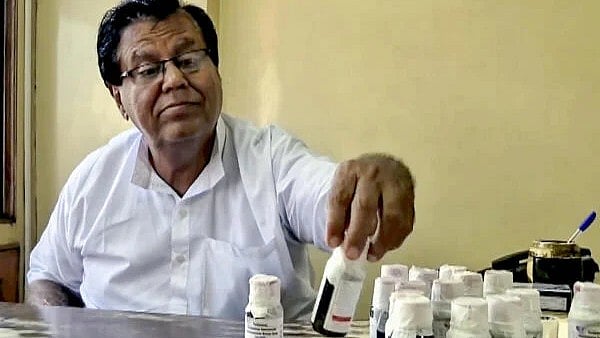
An official looks at bottles of the ‘Coldrif’ cough syrup after a raid by the Drug and Pharmaceuticals Department officials at Kataria Pharmaceuticals, after the deaths of 11 children, nine in Madhya Pradesh and two in Rajasthan, allegedly linked to contaminated cough syrup, in Jabalpur, Madhya Pradesh.
Credit: PTI Photo
New Delhi: Amid concerns over the quality of cough syrups, the Union Health Ministry on Sunday underlined the need for all drug manufacturers to comply with the Revised Schedule M and said that strict action will be taken against violators.
The ministry convened a high-level meeting under the chairmanship of Union Health Secretary Punya Salila Srivastava with all states and Union territories to review compliance with drug quality norms and promote the rational use of cough syrups, especially in paediatric populations.
The meeting comes in the backdrop of recent reports of child deaths in Chhindwara in Madhya Pradesh and Rajasthan allegedly linked to contaminated cough syrups.
During the meeting, states were advised to ensure rational use of cough syrups, particularly among children, as most coughs are self-limiting and do not require pharmacological treatment, the ministry said in a statement.
The advisory issued by the Directorate General of Health Services (DGHS) on the rational use of cough syrups in paediatric populations was also discussed, it said.
The matter was earlier reviewed by Union Health Minister J P Nadda, who had directed that the issue be discussed with states and Union territories to ensure necessary actions, it added.
In the meeting principal secretary (Health), Rajasthan, informed that the state's investigation so far indicates that the four deaths were not linked to the quality of cough syrup.
An awareness campaign is being conducted for rational use of paediatric formulation. However, by way of abundant caution, various regulatory actions have been undertaken. Further investigations are being conducted, the statement said.
It said the discussions in the meeting centred on three key points -- compliance with Schedule M and other GSR provisions relating to quality standards in drug manufacturing units; rational use of cough syrups in children, including the need to avoid irrational combinations and inappropriate formulations; and strengthening regulation of retail pharmacies to prevent sale and misuse of such formulations.
The Metropolitan Surveillance Unit (MSU), Nagpur, established under the Pradhan Mantri Ayushman Bharat Health Infrastructure Mission (PM-ABHIM), had reported a cluster of cases and related deaths to Integrated Disease Surveillance Programme (IDSP), National Centre for Disease Control (NCDC) from a block in Chhindwara district, the statement said.
Taking cognisance of the situation, a central team of experts comprising epidemiologists, microbiologists, entomologists and drug inspectors from the NCDC, National Institute of Virology (NIV) and Central Drugs Standard Control Organisation (CDSCO) visited Chhindwara and Nagpur and conducted a detailed analysis of the reported cases and deaths in coordination with the Madhya Pradesh authorities, it said.
Various clinical, environmental, entomological and drug samples were collected and sent to NIV Pune, Central Drug Laboratory (CDL) Mumbai, and National Environmental Engineering Research Institute (NEERI) Nagpur for laboratory testing.
Preliminary findings ruled out common infectious diseases except for one positive case of leptospirosis, according to the statement.
It said 19 samples of medicines which were consumed by children were collected from treating private practitioners and nearby retail stores. The chemical analysis so far indicates that of the 10 samples analysed till date, nine meet quality standards.
However, one of them, cough syrup Coldrif, contains DEG beyond the permissible limit. Subsequently, regulatory action has been taken by Tamil Nadu FDA on the medicine manufacturing unit located in Kancheepuram, it said.
Cancellation of the manufacturing licence has been recommended by the CDSCO based on the inspection findings. Criminal proceedings have also been initiated, it added.
According to the statement, it was also informed that Risk-Based Inspections (RBI) have been initiated across 19 manufacturing units in six states to identify systemic gaps and strengthen quality assurance mechanisms.
States and union territories were also advised to ensure enhanced surveillance, timely reporting by all health facilities (both government and private), wider dissemination of the community reporting tool of IDSP-IHIP, and strengthened interstate coordination for early reporting and joint action in the context of outbreak response and unusual health events, the statement said.
Indian Council of Medical Research (ICMR) Director General Dr Rajiv Bahl said children should not be prescribed cough syrups or any combination of drugs to prevent any side effects.
Dr Bahl also highlighted that the National Joint Outbreak Response Team is already functional, ensuring effective coordination between different central organisations like NCDC and ICMR, etc., which can assist states in need.
He also advised states to strengthen coordination between their agencies for a rapid response to any calamity.
DGHS Sunita Sharma highlighted the need for rational use of cough syrup for the pediatric population. She informed that cough medications have minimal proven benefit in children but carry significant risks.
She underlined the need for checking all medications to avoid combined overdose and checking concentration of drugs. Guidelines in this regard will also be formulated shortly for parents, pharmacists and doctors and shared with the states, she said.
Drugs Controller General of India (DCGI) Dr Rajeev Raghuvanshi reiterated the need for drug manufacturing units to strictly comply with the Revised Schedule M for Good Manufacturing Practices (GMP), according to the statement.
He noted that certain firms which applied for the government's infrastructure upgradation scheme have been given an extension till December 2025 and urged states to strictly implement the revised GMP norms.